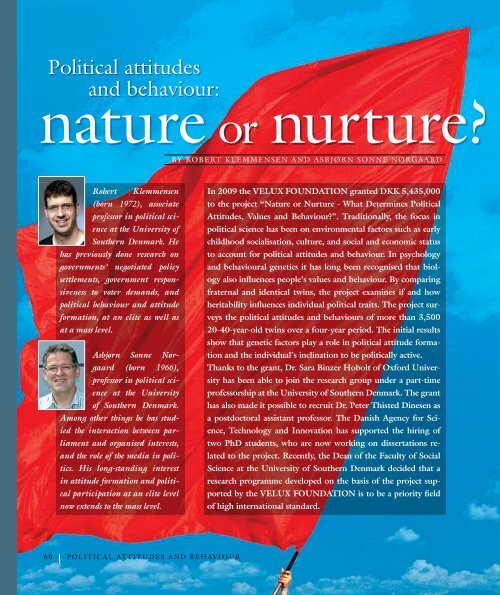Home to the skylark - The Velux Foundations
Home to the skylark - The Velux Foundations
Home to the skylark - The Velux Foundations
You also want an ePaper? Increase the reach of your titles
YUMPU automatically turns print PDFs into web optimized ePapers that Google loves.
Political attitudes<br />
and behaviour:<br />
nature or nurture?<br />
BY ROBERT KLEMMENSEN AND ASBJØRN SONNE NØRGAARD<br />
Robert Klemmensen<br />
(born 1972), associate<br />
professor in political sci-<br />
ence at <strong>the</strong> University of<br />
Sou<strong>the</strong>rn Denmark. He<br />
has previously done research on<br />
governments’ negotiated policy<br />
settlements, government respon-<br />
siveness <strong>to</strong> voter demands, and<br />
political behaviour and attitude<br />
formation, at an elite as well as<br />
at a mass level.<br />
Asbjørn Sonne Nør-<br />
gaard (born 1966),<br />
professor in political sci-<br />
ence at <strong>the</strong> University<br />
of Sou<strong>the</strong>rn Denmark.<br />
Among o<strong>the</strong>r things he has stud-<br />
ied <strong>the</strong> interaction between par-<br />
liament and organised interests,<br />
and <strong>the</strong> role of <strong>the</strong> media in poli-<br />
tics. His long-standing interest<br />
in attitude formation and politi-<br />
cal participation at an elite level<br />
now extends <strong>to</strong> <strong>the</strong> mass level.<br />
In 2009 <strong>the</strong> VELUX FOUNDATION granted DKK 5,435,000<br />
<strong>to</strong> <strong>the</strong> project “Nature or Nurture - What Determines Political<br />
Attitudes, Values and Behaviour?”. Traditionally, <strong>the</strong> focus in<br />
political science has been on environmental fac<strong>to</strong>rs such as early<br />
childhood socialisation, culture, and social and economic status<br />
<strong>to</strong> account for political attitudes and behaviour. In psychology<br />
and behavioural genetics it has long been recognised that biol-<br />
ogy also influences people’s values and behaviour. By comparing<br />
fraternal and identical twins, <strong>the</strong> project examines if and how<br />
heritability influences individual political traits. <strong>The</strong> project sur-<br />
veys <strong>the</strong> political attitudes and behaviours of more than 3,500<br />
20-40-year-old twins over a four-year period. <strong>The</strong> initial results<br />
show that genetic fac<strong>to</strong>rs play a role in political attitude forma-<br />
tion and <strong>the</strong> individual’s inclination <strong>to</strong> be politically active.<br />
Thanks <strong>to</strong> <strong>the</strong> grant, Dr. Sara Binzer Hobolt of Oxford Univer-<br />
sity has been able <strong>to</strong> join <strong>the</strong> research group under a part-time<br />
professorship at <strong>the</strong> University of Sou<strong>the</strong>rn Denmark. <strong>The</strong> grant<br />
has also made it possible <strong>to</strong> recruit Dr. Peter Thisted Dinesen as<br />
a postdoc<strong>to</strong>ral assistant professor. <strong>The</strong> Danish Agency for Sci-<br />
ence, Technology and Innovation has supported <strong>the</strong> hiring of<br />
two PhD students, who are now working on dissertations re-<br />
lated <strong>to</strong> <strong>the</strong> project. Recently, <strong>the</strong> Dean of <strong>the</strong> Faculty of Social<br />
Science at <strong>the</strong> University of Sou<strong>the</strong>rn Denmark decided that a<br />
research programme developed on <strong>the</strong> basis of <strong>the</strong> project sup-<br />
ported by <strong>the</strong> VELUX FOUNDATION is <strong>to</strong> be a priority field<br />
of high international standard.<br />
Since <strong>the</strong> era of Enlightenment, social sciences have largely assumed that<br />
human behaviour, feelings and values could be explained by externally<br />
given fac<strong>to</strong>rs. Man is born as a ‘clean slate’, a ‘tabula rasa’. Gradually, <strong>the</strong><br />
slate fills up via early socialisation at home, <strong>the</strong>n among friends, at edu-<br />
cational institutions and with experiences from work and family life. All<br />
<strong>the</strong>se elements help people shape <strong>the</strong>ir outlook on life.<br />
According <strong>to</strong> this classic paradigm, we should be able <strong>to</strong> explain our at-<br />
titudes and values by differences in <strong>the</strong> socialisation <strong>to</strong> which we have<br />
been exposed. It follows that people who have been exposed <strong>to</strong> identical<br />
socialisation and have similar experiences should develop similar values<br />
and attitudes.<br />
<strong>The</strong> challenge<br />
Our project challenges <strong>the</strong>se assumptions. We ask <strong>to</strong> what extent biology<br />
can explain why people develop different attitudes; in o<strong>the</strong>r words, could<br />
genetic disposition play a role in addition <strong>to</strong> external socialisation?<br />
<strong>The</strong> first step in our investigation is <strong>to</strong> examine whe<strong>the</strong>r attitudes and<br />
values are heritable at all. If <strong>the</strong>y turn out <strong>to</strong> be partially heritable, <strong>the</strong><br />
assumption of socialisation as <strong>the</strong> only cause of attitudes and values must<br />
be rejected.<br />
<strong>The</strong> Danish Twin Registry at<br />
<strong>the</strong> University of Sou<strong>the</strong>rn<br />
Denmark is <strong>the</strong> oldest of its<br />
kind in <strong>the</strong> world, and as such<br />
a mine of information for scientists<br />
interested in <strong>the</strong> significance<br />
of heritability and environment<br />
in <strong>the</strong> context of ageing<br />
and predisposition <strong>to</strong> certain<br />
diseases. <strong>The</strong> registry is<br />
now also being used <strong>to</strong> investigate<br />
how heritability and environment<br />
influence political<br />
attitudes and political involvement.<br />
Logo: <strong>The</strong> Danish Twin<br />
Registry<br />
Identical twins have not only<br />
been raised by <strong>the</strong> same parents,<br />
genetically <strong>the</strong>y are also<br />
100% identical. Both fac<strong>to</strong>rs<br />
may indicate that <strong>the</strong>y develop<br />
identical political attitudes<br />
and interests, because heritability<br />
<strong>to</strong>o plays a role. Pho<strong>to</strong>:<br />
Colourbox.com<br />
60 POLITICAL ATTITUDES AND BEHAVIOUR VELUX FOUNDATION 61<br />
HUMANITIES



